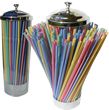When a Cafe "Works"...
Restaurants always claim to be more, offering an "immersive experience," but in reality the "experience" is really just a pre-fabricated set of interactions with the wait staff and accoutrements designed to lure you into believing you've had a one-of-a-kind experience. Sure, there's a personable wait staff, and sure, the food you order influences the time you have, but in the end you're just walking out with the same general time that everyone else in the place just had -- unless you're a regular and got your drink and dessert comped for free.
A cafe is essentially the same thing, but with a twist. A cafe is a "place to eat and buy things," but it also has the distinction of being a neighborhood gathering place, more like a bar than a restaurant. The big difference is the lack of a subconscious ticking clock; more like a European restaurant, you're encouraged to stay as long as you'd like and just... enjoy the experience.
Granted, not every cafe is like this. High-volume cafes feel more like pit stops than cozy corner hideaways, and the cafes in a bookstore or other mall environment are certainly more function-based than the stand-alone kind. But at most cafes I've truly enjoyed, the intangible that springs to mind is "community."
Whether it's a the type of people who come there (students, professionals, dating couples, families, solo adventurers) or the mix thereof, the unhurried atmosphere mixed with the variety of the interpersonal vibe AND the recurrence of regulars lends itself to more of an "I'm part of the 'in' crowd" feeling. After awhile, the place starts to feel "off" if certain people aren't there at the same time every day. The familiar interactions between the staff and their favorite customers, the reassuring looks among the regulars who never actually speak but still recognize one another, and the occasional oddball occurrence that brings a disparate group of people together all has the benefit of making one feel as though this seemingly random assemblage of people is actually jointly involved in sharing one unified moment.
It's not always present. It comes, it goes, and even when it's "on," it doesn't last long. But, as in the best friendships and relationships, it's "on" more often than it is in other places. For me, it's this communal spirit that elevates a cafe from an establishment to a destination; a place to be.



